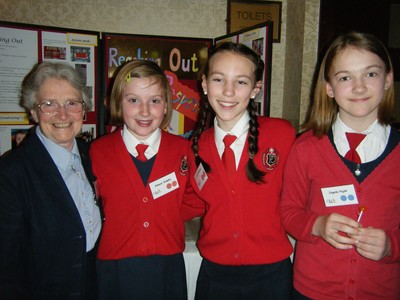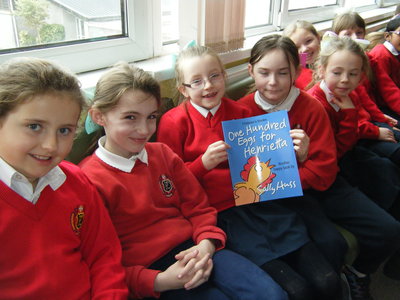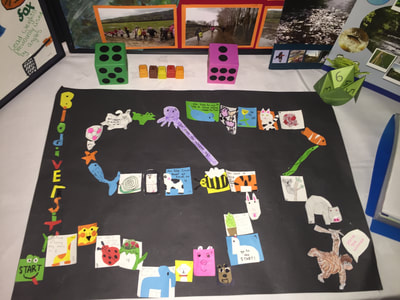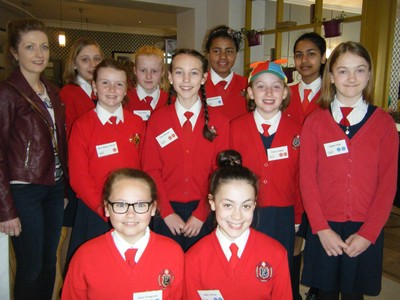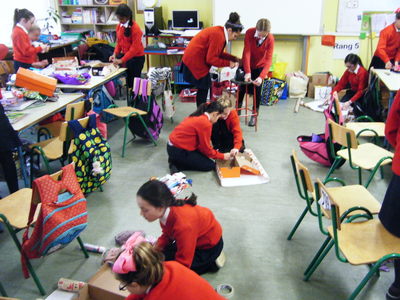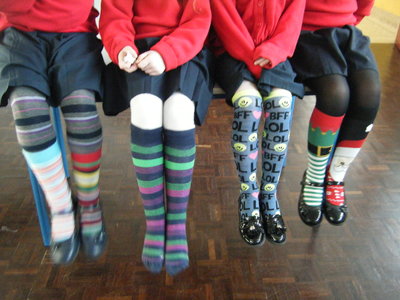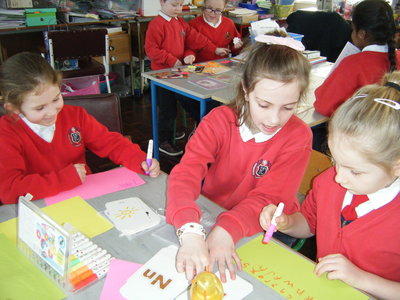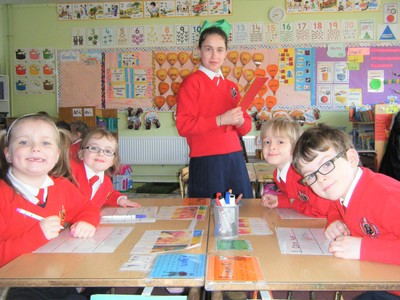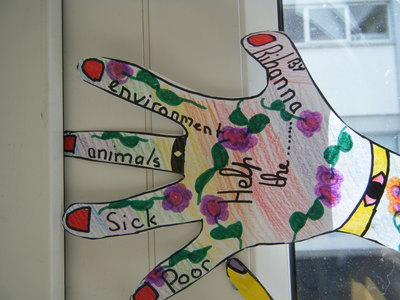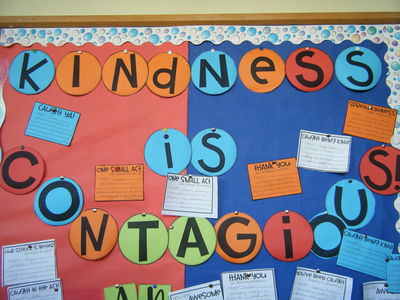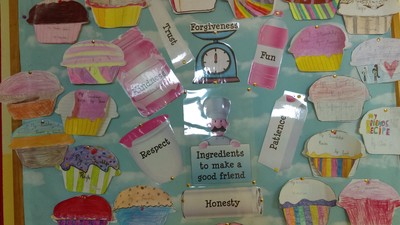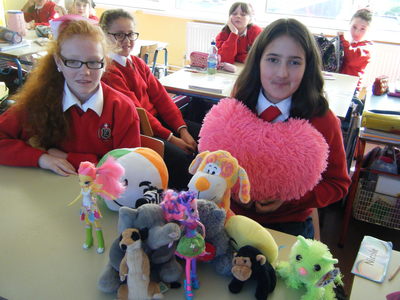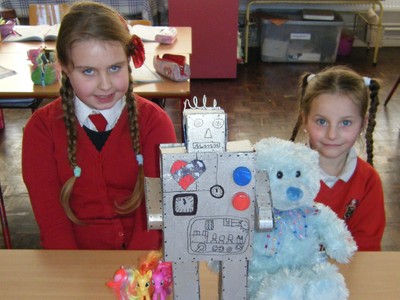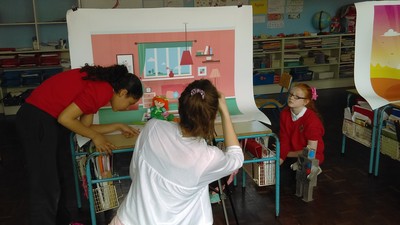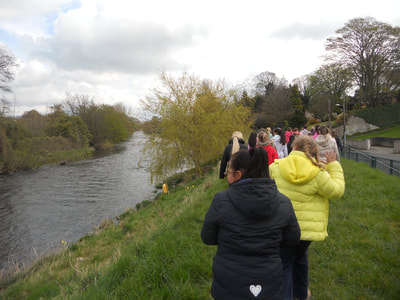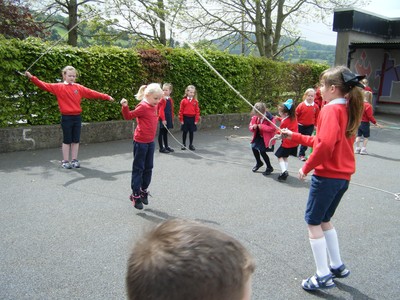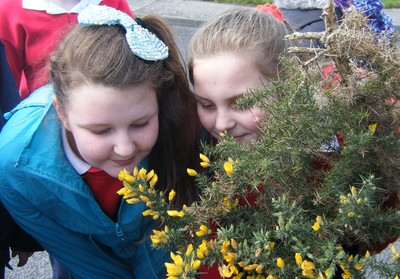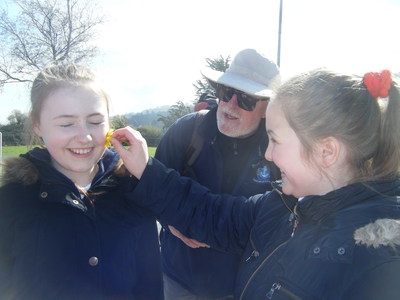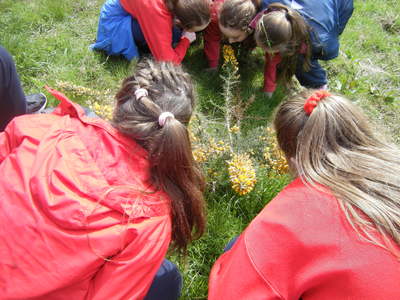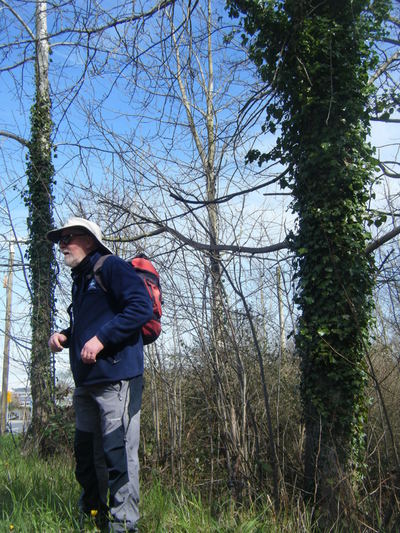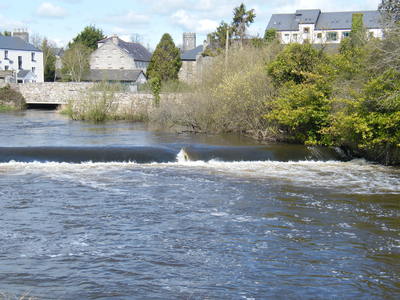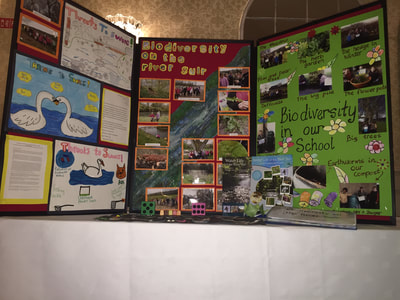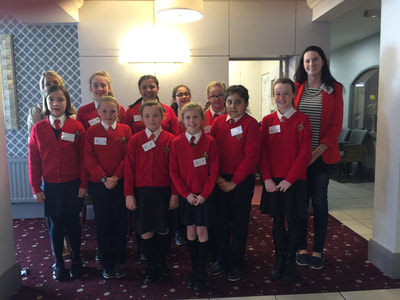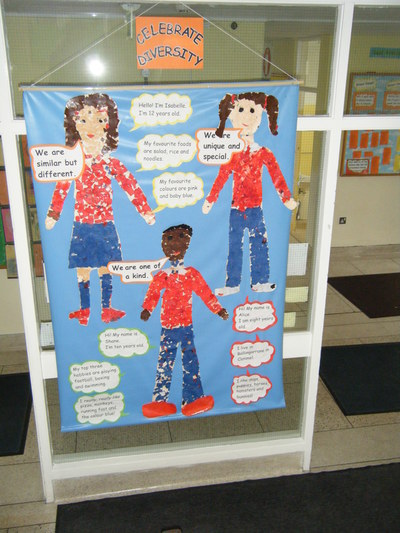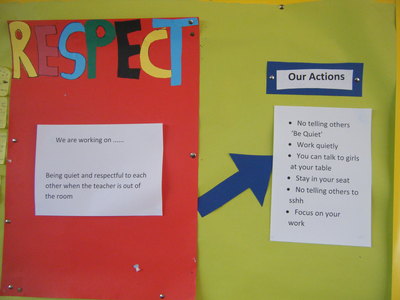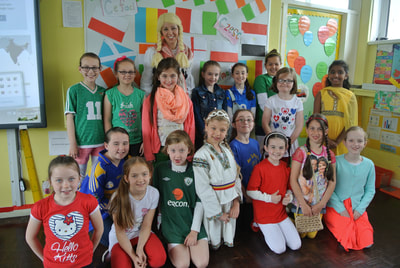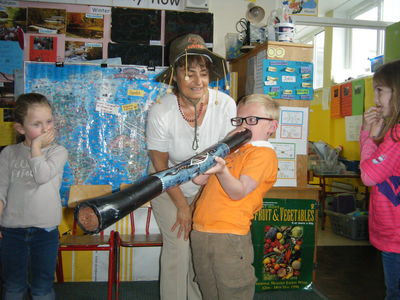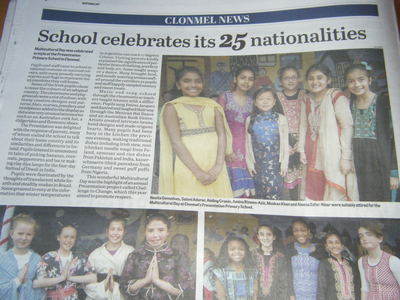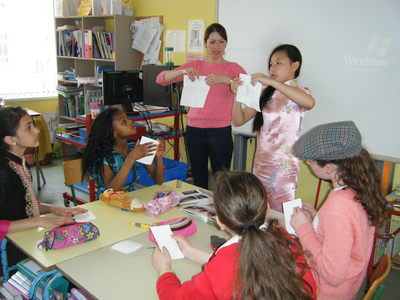What is 'Challenge to Change'?
Challenge to Change is a development education project aimed at young people attending the Presentation Sisters primary and post-primary schools in Ireland. The project aims to raise awareness and understanding of development issues and global inequality. Every year staff and pupils are invited to take part in an action project which will explore an issue/issues relating to (in)justice, human rights, fairtrade, racism, exploitation, etc. We in the Presentation Primary School, Clonmel, have been taking part in Challenge to Change since 2006. Every year bring new ideas, new excitement and new learning. Well done to everyone involved.
Thinking Green 2021-2022
We chose this topic because our main objective this year was to experience planting and to learn more about the benefits of planting and growing. We chose planting because, as one of our girls in Rang 6 explains ‘Planting is fun and good for the environment and children like it too. Children will learn a lot when they have fun.’ (Imaan, Rang 6).
As the year progressed, we covered other aspects of environmental work and we realised that any changes we make to improve our environment will help to keep the earth alive and green.
What did we do?
Many classes from infants to Rang 6 enjoyed the fun, excitement and anticipation of planting and growing. All our infant classes grew sunflowers from seeds and the Language Classes grew begonias.
‘Camida’, a Clonmel-based company, gave us a gift of twenty trees which pupils planted in rows leading to the sports field and in other suitable places around the grounds.
‘Camida’ also gave every child in the school a gift of a box of wildflower seeds. We are looking forward to displaying some photos of our wildflowers around the school before the holidays.
Rang 6 learned about deforestation: where it happens, why it happens, the effects on the area and on the world, possible solutions etc.
Rang 5 learned about waste management: types of waste, methods of disposal, benefits of composting etc. The girls are making board games which they will play with pupils in Rang 1 and Rang 2 to help the younger children to make good choices about their waste.
Rang 2 got involved in a project called ‘Picker Pals’ which provides materials for children and their families to get involved in picking up litter in their home environment.
Rang 4 and Rang 2 learned about the importance of bees to life on earth. They celebrated their learning through writing and art.
Rang 6 led a project whereby each class collected their waste bottle caps over a number of months. Rang 6 used the bottle caps to create two beautiful art displays on a marine theme.
A ‘green schools committee’ of pupils from Rang 2-6 guided us as we aimed to reduce energy consumption in the school.
What were our Aims and Objectives?
Gain an appreciation of the wonder of plant and animal life on earth.
Understand biodiversity.
Learn about deforestation and its impact.
Understand why trees are important for reducing Climate Change and protecting biodiversity.
Learn to grow plants in school and at home.
Learn about climate change and about the 17 Sustainable Development Goals (an overview with a focus on no. 14 ‘Life below Water’ and no. 15 ‘Life on Land’. (Senior pupils)
What did the pupils have to say?
‘We think the board games will help the younger children to use the proper bin every time.’ Layla and Natasha, Rang 5.
‘6th Class took it in turns to be ‘energy monitors’ and I think that helped the school to reduce the amount of energy we use.’ Áine, Rang 6.
‘I enjoyed working on the bottle cap art. I think it’s useful that the bottle caps did not go into the bin; instead they now on art that will last a long time. It also showed us how many plastic bottle caps we use!’ Cayla, Rang 6
‘I think planting is fun. Learning about saving the earth could sometimes be boring or stressful for small children, but planting makes it fun.’ Imaan, Rang 6
More to do!
This year we enjoyed planting indoors and outdoors, and we learned a lot about protecting our environment and preventing climate change. We have plenty of plans for June and into next year, especially:
Thank you for reading about our Challenge to Change project.
As the year progressed, we covered other aspects of environmental work and we realised that any changes we make to improve our environment will help to keep the earth alive and green.
What did we do?
Many classes from infants to Rang 6 enjoyed the fun, excitement and anticipation of planting and growing. All our infant classes grew sunflowers from seeds and the Language Classes grew begonias.
‘Camida’, a Clonmel-based company, gave us a gift of twenty trees which pupils planted in rows leading to the sports field and in other suitable places around the grounds.
‘Camida’ also gave every child in the school a gift of a box of wildflower seeds. We are looking forward to displaying some photos of our wildflowers around the school before the holidays.
Rang 6 learned about deforestation: where it happens, why it happens, the effects on the area and on the world, possible solutions etc.
Rang 5 learned about waste management: types of waste, methods of disposal, benefits of composting etc. The girls are making board games which they will play with pupils in Rang 1 and Rang 2 to help the younger children to make good choices about their waste.
Rang 2 got involved in a project called ‘Picker Pals’ which provides materials for children and their families to get involved in picking up litter in their home environment.
Rang 4 and Rang 2 learned about the importance of bees to life on earth. They celebrated their learning through writing and art.
Rang 6 led a project whereby each class collected their waste bottle caps over a number of months. Rang 6 used the bottle caps to create two beautiful art displays on a marine theme.
A ‘green schools committee’ of pupils from Rang 2-6 guided us as we aimed to reduce energy consumption in the school.
What were our Aims and Objectives?
Gain an appreciation of the wonder of plant and animal life on earth.
Understand biodiversity.
Learn about deforestation and its impact.
Understand why trees are important for reducing Climate Change and protecting biodiversity.
Learn to grow plants in school and at home.
Learn about climate change and about the 17 Sustainable Development Goals (an overview with a focus on no. 14 ‘Life below Water’ and no. 15 ‘Life on Land’. (Senior pupils)
What did the pupils have to say?
‘We think the board games will help the younger children to use the proper bin every time.’ Layla and Natasha, Rang 5.
‘6th Class took it in turns to be ‘energy monitors’ and I think that helped the school to reduce the amount of energy we use.’ Áine, Rang 6.
‘I enjoyed working on the bottle cap art. I think it’s useful that the bottle caps did not go into the bin; instead they now on art that will last a long time. It also showed us how many plastic bottle caps we use!’ Cayla, Rang 6
‘I think planting is fun. Learning about saving the earth could sometimes be boring or stressful for small children, but planting makes it fun.’ Imaan, Rang 6
More to do!
This year we enjoyed planting indoors and outdoors, and we learned a lot about protecting our environment and preventing climate change. We have plenty of plans for June and into next year, especially:
- Peer teaching between Rang 5/Rang 6 and Rang 1/Rang 2.
- Rang 6 are going to plant patio boxes with Ms. Prendergast and Mr. Connery in June.
- We hope to make progress with our sensory garden 2022/2023.
Thank you for reading about our Challenge to Change project.
Save our World to Save our Future
Save our World to Save our Future
(Challenge to Change Project October 2018)
Our Challenge to Change project this year is based on the ‘Sustainable Development Goals’. The ‘Sustainable Development Goals’ is a group of 17 goals that the whole world is trying to achieve by 2030. Our school is taking on 3 of these 17 goals. Goal #12, Sustainable Consumption and Production. #14, Life below Water and #15 Life on Land.
Goal 12, Sustainable Consumption and Production.
This means we’re trying to only make, grow and produce what we are going to consume or use so that we won’t be wasting our world’s natural resources.
Each year about one third of all our food ends up rotting in bins.
Our agreements at the last Assembly are
Goals 14 and 15
During the year, if you do any work in class about life on land or life under the sea, please remember to think about Challenge to Change. Think about how we can respect and care for life on land and life under the sea.
Challenge to Change January 2019
Three girls from Rang 6 presented an outline of the project at Assembly. Pupils and staff asked questions and we made agreements. Changes we agreed to make include:
Goal 14. Life below water
Goal 15. Life on land
Challenge to Change May 2019
Rang 6 planned, designed and made board games to help younger children grow in environmental awareness. They played the games with pupils in Rang 2. The time spent in Rang 2 was exciting and encouraging. The younger girls responded well to every game.
Ms. Hyland brought misshapen carrots to school to show them to us. Ms. Hyland’s friend is a farmer who grows carrots. Supermarkets only buy the usual shaped carrots from the farmer in case shoppers will not buy unusual carrots. We thought this was an unusual idea. We had not known that people expected carrots to look a certain way, that they wanted ‘perfect carrots’.
Rang 6 pupils explained about the carrots to classes 2-5 at Assembly. We looked at the carrots and discussed what we could do with them. Some of the ideas included: make carrot soup, make stew, make coleslaw, make stir-fry, make carrot cake, eat carrot sticks, cook them with parsnips or put them in lasagne. Mrs. L took them home and cooked them with parsnips for her family!
Pupils created a display to promote care of the earth. We used photos of litter and photos of carefully kept places. We posed questions such as ‘What do you think of this?’, ‘Do you want to work with the world and care for it?’
We made other displays about caring for our environment. Our Green School Committee worked very hard to teach us how to reduce our use of plastic and tin-foil. We continued our efforts to reuse materials, especially paper. We tried to limit waste. We continued to promote the use of the correct bin every time e.g. dirty waste bin, compost bin and recyclable bin.
(Challenge to Change Project October 2018)
Our Challenge to Change project this year is based on the ‘Sustainable Development Goals’. The ‘Sustainable Development Goals’ is a group of 17 goals that the whole world is trying to achieve by 2030. Our school is taking on 3 of these 17 goals. Goal #12, Sustainable Consumption and Production. #14, Life below Water and #15 Life on Land.
Goal 12, Sustainable Consumption and Production.
This means we’re trying to only make, grow and produce what we are going to consume or use so that we won’t be wasting our world’s natural resources.
Each year about one third of all our food ends up rotting in bins.
Our agreements at the last Assembly are
- Limit the food waste in our bins – try to eat apples down to core. Bring home food we do not want or like so our parents know the amount we need and what we like.
- We will reduce our use of tin-foil and cling film. We will use lunch boxes and reusable drink containers.
- We will fill up our copy pages.
- We will use reusable bags where possible.
- We will use the back of pages/recycled paper when it suits the task.
Goals 14 and 15
During the year, if you do any work in class about life on land or life under the sea, please remember to think about Challenge to Change. Think about how we can respect and care for life on land and life under the sea.
Challenge to Change January 2019
Three girls from Rang 6 presented an outline of the project at Assembly. Pupils and staff asked questions and we made agreements. Changes we agreed to make include:
- To limit waste of paper. We will reuse where possible and we will fill up our copy pages.
- To reduce our use of plastic and tin-foil. We will try to use reusable bottles and lunchboxes.
- To reduce energy usage. We will turn off lights and electrical appliances when not in use.
- To protect our environment. We will not litter. We will use the correct bins including compost.
- To limit waste of the earth’s resources. We will try not to waste food. We will try to eat all our fruit e.g. cut down on half-eaten apples in the compost bins, tell our parents if we do not like a particular lunch item instead of throwing it in the bin.
- Miss Conway taught Rang 5 and Rang 6 two songs based on our theme – ‘I am the Earth’ and ‘This is our World’. The pupils then taught ‘This is our World’ to younger classes at Assembly.
- Rang 6 are learning about the Sustainable Development Goals, especially the three goals we are focusing on:
Goal 14. Life below water
Goal 15. Life on land
- We are in the process of creating a display board to promote our project and to raise awareness of the goals and our actions.
Challenge to Change May 2019
Rang 6 planned, designed and made board games to help younger children grow in environmental awareness. They played the games with pupils in Rang 2. The time spent in Rang 2 was exciting and encouraging. The younger girls responded well to every game.
Ms. Hyland brought misshapen carrots to school to show them to us. Ms. Hyland’s friend is a farmer who grows carrots. Supermarkets only buy the usual shaped carrots from the farmer in case shoppers will not buy unusual carrots. We thought this was an unusual idea. We had not known that people expected carrots to look a certain way, that they wanted ‘perfect carrots’.
Rang 6 pupils explained about the carrots to classes 2-5 at Assembly. We looked at the carrots and discussed what we could do with them. Some of the ideas included: make carrot soup, make stew, make coleslaw, make stir-fry, make carrot cake, eat carrot sticks, cook them with parsnips or put them in lasagne. Mrs. L took them home and cooked them with parsnips for her family!
Pupils created a display to promote care of the earth. We used photos of litter and photos of carefully kept places. We posed questions such as ‘What do you think of this?’, ‘Do you want to work with the world and care for it?’
We made other displays about caring for our environment. Our Green School Committee worked very hard to teach us how to reduce our use of plastic and tin-foil. We continued our efforts to reuse materials, especially paper. We tried to limit waste. We continued to promote the use of the correct bin every time e.g. dirty waste bin, compost bin and recyclable bin.
One World One People
One World One People
(Challenge to Change Project 2017-2018)
Our Actions:
The theme ‘Managing our Waste’ was discussed, promoted and developed through discussion, story, PowerPoint, drama and song at Assembly and in class. We recycle in all classes and regularly teach pupils the correct way to use a) the compost bin, b) the recycle bin c) the general waste bin and d) the bin for cartons that need to be washed before recycling. In order to encourage the correct use of bins, a team of ‘Bin Busters’ paid a visit to every class after break and lunch until the October break. Green stickers were awarded for the correct use of bins and the class with the most stickers every month won a homework pass.
We displayed our latest drawings, paintings, poems and posters on a noticeboard to keep everyone informed about our efforts.
We regularly taught lessons to ensure pupils are aware of the part they play in keeping our environment clean and healthy.
Rang 4 learned about deforestation in the rainforests. Their work included making posters and bookmarks and writing poems. The girls also wrote letters about the issue of deforestation to influential leaders of their choice.
Rang 5 learned about the benefits of Fairtrade and how we can contribute to a fairer world for all. Their work included games, drama and designing posters. The girls also engaged in a ‘Fairtrade’ hunt at home and in local shops.
To further our understanding of Fairtrade, Mrs. O’ Dwyer and the Language Classes taught us about Fairtrade through a drama at Assembly.
Rang 6 focused on pollution, especially water pollution. The girls studied aspects of our local river, the River Suir, and its historical, leisure, natural and industrial heritage. In other lessons Rang 6 learned about workers’ rights and child labour around the world, historically and in the new millennium.
Our caretaker built new garden boxes for us on grass. This space is near our compost bins and water butt so pupils can witness first-hand the process of growth. A team of pupils took responsibility for watering the plants in the hot weather.
Many classes planted seeds in their classrooms or in our garden and pupils regularly took care of the plants by watering and weeding them.
We maintained our ‘See how we all Fit Together’ multi-cultural display of maps and photos on the main corridor all year.
We celebrated our wonderfully diverse heritage and backgrounds on Multicultural Day in April. Pupils and staff came to school in national costume or national colours, with many proudly carrying scarfs and flags to represent the twenty plus countries we call home. Some of the Irish pupils chose to wear the colours of an ‘adopted’ country as we had so recently celebrated St. Patrick’s Day. Many of our Traveller pupils chose to walk with the Pavee Point flag and a ‘Proud to be a Native Irish Traveller’ flag.
Varied and exciting activities took place all day. The classrooms were a riot of colour, and pupils admired each other and wondered at the creative designs and patterns. Many parents took up the offer of visiting a class to talk about their home country and its similarities and differences to Ireland. We enjoyed stories, songs, games and food from countries all over the world! Emma from Rang 5 and Joanne from Rang 3 shared stories, interests and mementos from the Traveller culture with other classes. The highlight of the day was our parade around the school. To our delight, some parents took time off work to come to join the parade.
Outcomes: Pupils and staff enjoyed working on this project. The theme suited all age-groups and had a positive impact in classrooms and around the school. We learned a lot about managing our waste in our school grounds and in our classrooms. We learned about the need to similarly care for our rivers and the wider world. We celebrated our diverse yet connected heritage and experience and highlighted many of the benefits of diversity.
Recommendations: We would recommend these themes for a Challenge to Change project as they can be understood by all. It encouraged us to teach clear strategies for caring for our environment. It enabled us to celebrate our wonderful multicultural heritage. Feedback from pupils and families was very positive.
‘We share the future
Stand side by side
One Earth, one people
We’ll turn the tide
And in the future
They’ll say with pride
One Earth, one people
We turned the tide’
(Lyrics from ‘I am the Earth’ song.)
Compiled by Noelle Lambert
(Challenge to Change Project 2017-2018)
Our Actions:
The theme ‘Managing our Waste’ was discussed, promoted and developed through discussion, story, PowerPoint, drama and song at Assembly and in class. We recycle in all classes and regularly teach pupils the correct way to use a) the compost bin, b) the recycle bin c) the general waste bin and d) the bin for cartons that need to be washed before recycling. In order to encourage the correct use of bins, a team of ‘Bin Busters’ paid a visit to every class after break and lunch until the October break. Green stickers were awarded for the correct use of bins and the class with the most stickers every month won a homework pass.
We displayed our latest drawings, paintings, poems and posters on a noticeboard to keep everyone informed about our efforts.
We regularly taught lessons to ensure pupils are aware of the part they play in keeping our environment clean and healthy.
Rang 4 learned about deforestation in the rainforests. Their work included making posters and bookmarks and writing poems. The girls also wrote letters about the issue of deforestation to influential leaders of their choice.
Rang 5 learned about the benefits of Fairtrade and how we can contribute to a fairer world for all. Their work included games, drama and designing posters. The girls also engaged in a ‘Fairtrade’ hunt at home and in local shops.
To further our understanding of Fairtrade, Mrs. O’ Dwyer and the Language Classes taught us about Fairtrade through a drama at Assembly.
Rang 6 focused on pollution, especially water pollution. The girls studied aspects of our local river, the River Suir, and its historical, leisure, natural and industrial heritage. In other lessons Rang 6 learned about workers’ rights and child labour around the world, historically and in the new millennium.
Our caretaker built new garden boxes for us on grass. This space is near our compost bins and water butt so pupils can witness first-hand the process of growth. A team of pupils took responsibility for watering the plants in the hot weather.
Many classes planted seeds in their classrooms or in our garden and pupils regularly took care of the plants by watering and weeding them.
We maintained our ‘See how we all Fit Together’ multi-cultural display of maps and photos on the main corridor all year.
We celebrated our wonderfully diverse heritage and backgrounds on Multicultural Day in April. Pupils and staff came to school in national costume or national colours, with many proudly carrying scarfs and flags to represent the twenty plus countries we call home. Some of the Irish pupils chose to wear the colours of an ‘adopted’ country as we had so recently celebrated St. Patrick’s Day. Many of our Traveller pupils chose to walk with the Pavee Point flag and a ‘Proud to be a Native Irish Traveller’ flag.
Varied and exciting activities took place all day. The classrooms were a riot of colour, and pupils admired each other and wondered at the creative designs and patterns. Many parents took up the offer of visiting a class to talk about their home country and its similarities and differences to Ireland. We enjoyed stories, songs, games and food from countries all over the world! Emma from Rang 5 and Joanne from Rang 3 shared stories, interests and mementos from the Traveller culture with other classes. The highlight of the day was our parade around the school. To our delight, some parents took time off work to come to join the parade.
Outcomes: Pupils and staff enjoyed working on this project. The theme suited all age-groups and had a positive impact in classrooms and around the school. We learned a lot about managing our waste in our school grounds and in our classrooms. We learned about the need to similarly care for our rivers and the wider world. We celebrated our diverse yet connected heritage and experience and highlighted many of the benefits of diversity.
Recommendations: We would recommend these themes for a Challenge to Change project as they can be understood by all. It encouraged us to teach clear strategies for caring for our environment. It enabled us to celebrate our wonderful multicultural heritage. Feedback from pupils and families was very positive.
‘We share the future
Stand side by side
One Earth, one people
We’ll turn the tide
And in the future
They’ll say with pride
One Earth, one people
We turned the tide’
(Lyrics from ‘I am the Earth’ song.)
Compiled by Noelle Lambert
'Reaching Out in Kindness' 2016-2017
All classes in the school took part in our 'Reaching Out' project over the course of the year. Here are some of the activities we engaged in:
Rang 4 and Rang 5 organised a whole-school ‘Crazy Hair and Socks’ day to raise funds for Lorevi in the Philippines. What fun!
Pupils in Rang 5 practised kindness by helping Senior Infant pupils learn reading, writing and Maths.
In December Rang 5 sorted the gifts pupils and families brought to school and made Christmas boxes for children in poorer countries.
Eve, Rang 4, told us about her friend who has alopecia and Eve’s decision to grow her hair long and donate it for a wig.
Rang 3 made a ‘Kindness is Contagious’ display board. The thank you notes built up over time.
Teachers kept our kindness theme alive by reading books and novels with kindness at their core.
Here we see Rang 2 enjoying an Easter themed story about a very kind hen!
We made an effort to keep our kindness theme alive in displays around the school.
Rang 4 enjoyed the novel ‘Wonder’ by R.J. Palacio which was read to them by their teacher. The girls highly recommend the book to senior primary classes, teenagers and adults!
Rang 6 researched charities and voluntary work and presented projects about their chosen charity.
Making a Film, an inter-class project
We made a film on the theme of kindness.
All classes from 2nd to 6th were invited to submit stories, poems or ideas. When all the stories were read, Mrs. Lambert combined a number of ideas and characters to create the story ‘Zuri’s Great Journey’.
We held ‘toy auditions’ to help us find toys that would suit our storyline!
Sara, in Rang 4, made a robot over the Easter holidays. The robot was just perfect for Zuri, the robot in our film.
On the day of the filming, girls from Rang 4 recorded the script into a mobile phone!
Mairéad, our film-maker, with help from Bláthnaid, directed the action. Five girls from Rang 4 brought the characters to life.
Mairéad edited the film footage and combined it with the audio to create our very own film.
We showed our film to everyone in school at Assembly and on the whiteboards in the infant class. (If you would like to, you can watch our film in the 'film' section of this website.)
“If every person in this room made it a rule that wherever you are, whenever you can, you will try to act a little kinder than is necessary - the world really would be a better place. And if you do this, if you act just a little kinder than is necessary, someone else, somewhere, someday, may recognize in you, in every single one of you, the face of God.”
― R.J. Palacio, Wonder
Rang 4 and Rang 5 organised a whole-school ‘Crazy Hair and Socks’ day to raise funds for Lorevi in the Philippines. What fun!
Pupils in Rang 5 practised kindness by helping Senior Infant pupils learn reading, writing and Maths.
In December Rang 5 sorted the gifts pupils and families brought to school and made Christmas boxes for children in poorer countries.
Eve, Rang 4, told us about her friend who has alopecia and Eve’s decision to grow her hair long and donate it for a wig.
Rang 3 made a ‘Kindness is Contagious’ display board. The thank you notes built up over time.
Teachers kept our kindness theme alive by reading books and novels with kindness at their core.
Here we see Rang 2 enjoying an Easter themed story about a very kind hen!
We made an effort to keep our kindness theme alive in displays around the school.
Rang 4 enjoyed the novel ‘Wonder’ by R.J. Palacio which was read to them by their teacher. The girls highly recommend the book to senior primary classes, teenagers and adults!
Rang 6 researched charities and voluntary work and presented projects about their chosen charity.
Making a Film, an inter-class project
We made a film on the theme of kindness.
All classes from 2nd to 6th were invited to submit stories, poems or ideas. When all the stories were read, Mrs. Lambert combined a number of ideas and characters to create the story ‘Zuri’s Great Journey’.
We held ‘toy auditions’ to help us find toys that would suit our storyline!
Sara, in Rang 4, made a robot over the Easter holidays. The robot was just perfect for Zuri, the robot in our film.
On the day of the filming, girls from Rang 4 recorded the script into a mobile phone!
Mairéad, our film-maker, with help from Bláthnaid, directed the action. Five girls from Rang 4 brought the characters to life.
Mairéad edited the film footage and combined it with the audio to create our very own film.
We showed our film to everyone in school at Assembly and on the whiteboards in the infant class. (If you would like to, you can watch our film in the 'film' section of this website.)
“If every person in this room made it a rule that wherever you are, whenever you can, you will try to act a little kinder than is necessary - the world really would be a better place. And if you do this, if you act just a little kinder than is necessary, someone else, somewhere, someday, may recognize in you, in every single one of you, the face of God.”
― R.J. Palacio, Wonder
Biodiversity 2015-2016
Presentation Primary School, Clonmel
Biodiversity – Learning about the Variety of Life
Goals and Aims: We wanted to encourage children to know about biodiversity, both in our school grounds and in our locality. We wanted to get children involved in looking after our school garden and caring for our environment.
Target Group: This was a whole-school project. We aimed to include all classes, all staff and all families.
Our Actions:
The theme ‘Biodiversity’ was discussed, promoted and developed through discussion, story, PowerPoint, drama and raps at Assembly and in class. We watched a PowerPoint presentation on how reducing carbon emissions will help stop the greenhouse effect. We also composed a Green Schools Rap about biodiversity and we sing it regularly at Assembly.
We invited local expert Shay Hurley to take Rang 5 and Rang 6 on a walk by the river Suir and to speak with them about biodiversity in the locality of the school and along the river. These walks were enjoyable, educational and great fun!
Teachers and pupils studied habitats and did habitat surveys around the school. We identified ways to improve our grounds for biodiversity. The Language classes created a bug hotel.
Every class has planted or is planting seeds in our garden and regularly goes down to look at the plants there and to water them. Rang 6 have started to paint and decorate the planting beds to make them more colourful and attractive for wildlife. We put up a nesting box and planted different vegetables and varieties of flowers to encourage biodiversity. We planted a wildflower bed near the staff car park.
We display our latest drawings, paintings, poems and surveys on a noticeboard to keep everyone informed about our efforts.
At School Assembly and Staff Meetings we discussed and prioritised what we think should be our focus for biodiversity. We created a biodiversity trail in our school grounds to encourage this. We regularly teach lessons to ensure pupils are aware of the part they play in keeping our environment clean and keeping biodiversity alive.
Rang 5 learned all about the swan and threats to the swan in Ireland, especially threats caused by people. The girls wrote to Clonmel Angling Association (C.D.S.T.A.A.) to express their concerns about threats to the swan in the river Suir. They received a reply stating that the anglers who fish in the Suir have many laws to keep the river and its stocks safe. They cannot overfish and they cannot keep trout that are less than 10 cm long. Lead ball weights are illegal and all broken fishing lines have to be disposed of properly. There is a policy of ‘catch and release’ for all salmon caught. The secretary of the association also provided the class with materials teaching about the lifecycle of the salmon. The girls were delighted to hear that the biggest fish caught in history was caught by a fisherwoman!
We recycle in all classes and regularly teach pupils the correct way to use a) the compost bin, b) the recycle bin and c) the general waste bin.
Outcomes: Pupils and staff enjoyed working on this project. The theme suited all age-groups and had a positive impact in classrooms and around the school. We learned a lot about biodiversity in our school grounds, along the river Suir and in our county.
Recommendations: We would recommend the theme ‘Biodiversity’ for a Challenge to Change project as it is a theme that can be understood by all. It encouraged us to enjoy outdoor learning and experiences. We received positive feedback from pupils and families.
Pupils’ comments:
Don’t let
Species go extinct
In this world
We all are linked!
(My favourite biodiversity quote, by Chloe Marx Rang 4)
We have to learn about other animals and insects, where they live, what they eat and when they come out. If we do not know this, we could endanger them. We could hurt or very badly injure them. Also, we could ruin their habitat and they would have nowhere to protect themselves. It is good to learn about biodiversity,
Kacie O’ Shea Rang 5
I enjoyed learning about biodiversity because it is very interesting to learn about different species of animals and different plants and how we all impact on the world around us.
Amelia Kolodziejczak Rang 5
Biodiversity is important because without biodiversity there would be no bees, and if there were no bees, there would be no trees and if there were no trees, there would be no air and without air nothing would survive. Biodiversity is in danger and that is why we must save it. We should promote it fully throughout the school to make people aware.
Ciara Ryan Rang 4
I enjoyed learning about biodiversity because it helps me understand how important nature is to our earth, especially how important it is to ourselves. It is absolutely essential to promote biodiversity, not just in our school but throughout the entire earth!
Róisín Dunphy Rang 5
Compiled by Claire Keane and Noelle Lambert
Biodiversity – Learning about the Variety of Life
Goals and Aims: We wanted to encourage children to know about biodiversity, both in our school grounds and in our locality. We wanted to get children involved in looking after our school garden and caring for our environment.
Target Group: This was a whole-school project. We aimed to include all classes, all staff and all families.
Our Actions:
The theme ‘Biodiversity’ was discussed, promoted and developed through discussion, story, PowerPoint, drama and raps at Assembly and in class. We watched a PowerPoint presentation on how reducing carbon emissions will help stop the greenhouse effect. We also composed a Green Schools Rap about biodiversity and we sing it regularly at Assembly.
We invited local expert Shay Hurley to take Rang 5 and Rang 6 on a walk by the river Suir and to speak with them about biodiversity in the locality of the school and along the river. These walks were enjoyable, educational and great fun!
Teachers and pupils studied habitats and did habitat surveys around the school. We identified ways to improve our grounds for biodiversity. The Language classes created a bug hotel.
Every class has planted or is planting seeds in our garden and regularly goes down to look at the plants there and to water them. Rang 6 have started to paint and decorate the planting beds to make them more colourful and attractive for wildlife. We put up a nesting box and planted different vegetables and varieties of flowers to encourage biodiversity. We planted a wildflower bed near the staff car park.
We display our latest drawings, paintings, poems and surveys on a noticeboard to keep everyone informed about our efforts.
At School Assembly and Staff Meetings we discussed and prioritised what we think should be our focus for biodiversity. We created a biodiversity trail in our school grounds to encourage this. We regularly teach lessons to ensure pupils are aware of the part they play in keeping our environment clean and keeping biodiversity alive.
Rang 5 learned all about the swan and threats to the swan in Ireland, especially threats caused by people. The girls wrote to Clonmel Angling Association (C.D.S.T.A.A.) to express their concerns about threats to the swan in the river Suir. They received a reply stating that the anglers who fish in the Suir have many laws to keep the river and its stocks safe. They cannot overfish and they cannot keep trout that are less than 10 cm long. Lead ball weights are illegal and all broken fishing lines have to be disposed of properly. There is a policy of ‘catch and release’ for all salmon caught. The secretary of the association also provided the class with materials teaching about the lifecycle of the salmon. The girls were delighted to hear that the biggest fish caught in history was caught by a fisherwoman!
We recycle in all classes and regularly teach pupils the correct way to use a) the compost bin, b) the recycle bin and c) the general waste bin.
Outcomes: Pupils and staff enjoyed working on this project. The theme suited all age-groups and had a positive impact in classrooms and around the school. We learned a lot about biodiversity in our school grounds, along the river Suir and in our county.
Recommendations: We would recommend the theme ‘Biodiversity’ for a Challenge to Change project as it is a theme that can be understood by all. It encouraged us to enjoy outdoor learning and experiences. We received positive feedback from pupils and families.
Pupils’ comments:
Don’t let
Species go extinct
In this world
We all are linked!
(My favourite biodiversity quote, by Chloe Marx Rang 4)
We have to learn about other animals and insects, where they live, what they eat and when they come out. If we do not know this, we could endanger them. We could hurt or very badly injure them. Also, we could ruin their habitat and they would have nowhere to protect themselves. It is good to learn about biodiversity,
Kacie O’ Shea Rang 5
I enjoyed learning about biodiversity because it is very interesting to learn about different species of animals and different plants and how we all impact on the world around us.
Amelia Kolodziejczak Rang 5
Biodiversity is important because without biodiversity there would be no bees, and if there were no bees, there would be no trees and if there were no trees, there would be no air and without air nothing would survive. Biodiversity is in danger and that is why we must save it. We should promote it fully throughout the school to make people aware.
Ciara Ryan Rang 4
I enjoyed learning about biodiversity because it helps me understand how important nature is to our earth, especially how important it is to ourselves. It is absolutely essential to promote biodiversity, not just in our school but throughout the entire earth!
Róisín Dunphy Rang 5
Compiled by Claire Keane and Noelle Lambert
Respect: Make the World a Better Place 2014-2015
Presentation Primary School, Clonmel
Respect – Make the World a Better Place
Goals and Aims: To examine the meaning of the word ‘respect’ and to learn how to live respectfully in school, at home, in the community and in the world.
To foster a sense of care and respect for ourselves and others and an appreciation of the dignity of every human being.
To celebrate our uniqueness and to explore our similarities and differences.
To foster an understanding of, and a concern for, the total interdependence of all humans, all living things and the earth on which we live.
To celebrate our rich cultural diversity and experiences.
Target Group: This was a whole-school project. We aimed to include all classes, all staff, all families and the wider Clonmel community.
Our Actions:
The theme ‘Respect’ was discussed, promoted and developed through discussion, story, PowerPoint, drama and raps at Assembly and in class.
Rang 1 learned the meaning and reasons for respect. Each child made her personal ‘Respect Pledge’ and is working towards keeping her pledge.
Rang 2 worked together to write a rap. They laminated the rap to create a placemat for each child. The girls bring the placemats with them when they move places to remind them to show respect wherever they are.
The Respect Rap by Rang 2
Really kind, really helpful.
Every day I’ll do my best
Stop the squabbling, smile awhile
Put on a pleasant, happy face
End those rows and start again.
Rang 3 decided on a class target to improve respect in their classroom. They decided to show respect to each other when the teacher was out of the room at lunchtime or at a meeting. They decided on clear actions to enable them to be more respectful to each other and displayed the agreed actions for reference.
Rang 4 worked on the theme ‘We are all Unique’ and created and displayed their ‘unique characters’ and a ‘Celebrate Diversity’ display.
Rang 4 took part in a ‘Roots of Empathy’ programme all year. Through the programme the pupils learned to respect the needs of a baby and to gain further understanding of the needs of all people of all ages all over the world.
Rang 5 and Rang 6 learned about inspirational people and leaders who brought about social and environmental change because of their respect for others and their respect for our natural world.
The whole school community took part in our wonderful Multicultural Day.
Outcomes: Pupils and staff enjoyed working on this project. The theme suited all age-groups and had a positive impact in classrooms and around the school. The Multicultural Day was a great success. Many parents and siblings visited the school to talk about their home countries, teach songs and share samples of food. The classrooms and playgrounds were a riot of colour as we all wore national costumes or the colours of an ‘adopted’ country. Many pupils and parents cooked and baked traditional dishes and treats which, needless to say, were very well received! Teachers taught lessons with a difference – food tasting, the Mexican Hat Dance, an Australian Bush dance, Frère Jacques, Chinese origami, Indian henna hand art and more! It truly was a showcasing of our respect for each other and a celebration of our magnificent traditions and cultures. Our local newspaper, ‘The Nationalist’ covered the story of our Multicultural Day, much to the delight of those photographed.
Recommendations: We would recommend the theme ‘Respect’ for a Challenge to Change project as it is a theme that can be understood by even the youngest pupil in a primary school and yet is the at the heart of Development Education. It was a positive topic that felt relevant at all times and that linked naturally with many curricular areas.
What our pupils thought:
‘Some of the things I learned about respect are… show kindness, show love, be nice, be kind. When you show respect, you feel good.’
Róisín, Rang 4
‘One of the things I learned about respect is – we want it, so why should we treat others any differently to how we want to be treated? Treat everyone with respect!’
Megan, Rang 4
‘Respect is important all over the world because if we had no respect, we would not be very nice.’
Abbie M-F, Rang 4
‘The Challenge to Change project about respect taught us to treat others better and how to be kind to people no matter what. Respect is important because it helps everyone to be happy and to feel good.’
SarahJane, Rang 5
‘The Challenge to Change seminar really opened my mind to people who are in need. Whenever I would storm off and cry about not getting a toy, I would I think I had the worst life. Oh how I was wrong. If I had more money I would donate it. So many people need so much help in the world.’
Cerys, Rang 5
R – E – S – P – E – C - T
I give it to you and you give it to me!
(lines from one of the raps we sang at Assembly)
“We live now in a global village and we are in one single family. It’s our responsibility to bring friendship and love from all different places around the world and to live together in peace." --Jackie Chan (Chinese Actor, Philanthropist, UNICEF Goodwill Ambassador)
Respect – Make the World a Better Place
Goals and Aims: To examine the meaning of the word ‘respect’ and to learn how to live respectfully in school, at home, in the community and in the world.
To foster a sense of care and respect for ourselves and others and an appreciation of the dignity of every human being.
To celebrate our uniqueness and to explore our similarities and differences.
To foster an understanding of, and a concern for, the total interdependence of all humans, all living things and the earth on which we live.
To celebrate our rich cultural diversity and experiences.
Target Group: This was a whole-school project. We aimed to include all classes, all staff, all families and the wider Clonmel community.
Our Actions:
The theme ‘Respect’ was discussed, promoted and developed through discussion, story, PowerPoint, drama and raps at Assembly and in class.
Rang 1 learned the meaning and reasons for respect. Each child made her personal ‘Respect Pledge’ and is working towards keeping her pledge.
Rang 2 worked together to write a rap. They laminated the rap to create a placemat for each child. The girls bring the placemats with them when they move places to remind them to show respect wherever they are.
The Respect Rap by Rang 2
Really kind, really helpful.
Every day I’ll do my best
Stop the squabbling, smile awhile
Put on a pleasant, happy face
End those rows and start again.
Rang 3 decided on a class target to improve respect in their classroom. They decided to show respect to each other when the teacher was out of the room at lunchtime or at a meeting. They decided on clear actions to enable them to be more respectful to each other and displayed the agreed actions for reference.
Rang 4 worked on the theme ‘We are all Unique’ and created and displayed their ‘unique characters’ and a ‘Celebrate Diversity’ display.
Rang 4 took part in a ‘Roots of Empathy’ programme all year. Through the programme the pupils learned to respect the needs of a baby and to gain further understanding of the needs of all people of all ages all over the world.
Rang 5 and Rang 6 learned about inspirational people and leaders who brought about social and environmental change because of their respect for others and their respect for our natural world.
The whole school community took part in our wonderful Multicultural Day.
Outcomes: Pupils and staff enjoyed working on this project. The theme suited all age-groups and had a positive impact in classrooms and around the school. The Multicultural Day was a great success. Many parents and siblings visited the school to talk about their home countries, teach songs and share samples of food. The classrooms and playgrounds were a riot of colour as we all wore national costumes or the colours of an ‘adopted’ country. Many pupils and parents cooked and baked traditional dishes and treats which, needless to say, were very well received! Teachers taught lessons with a difference – food tasting, the Mexican Hat Dance, an Australian Bush dance, Frère Jacques, Chinese origami, Indian henna hand art and more! It truly was a showcasing of our respect for each other and a celebration of our magnificent traditions and cultures. Our local newspaper, ‘The Nationalist’ covered the story of our Multicultural Day, much to the delight of those photographed.
Recommendations: We would recommend the theme ‘Respect’ for a Challenge to Change project as it is a theme that can be understood by even the youngest pupil in a primary school and yet is the at the heart of Development Education. It was a positive topic that felt relevant at all times and that linked naturally with many curricular areas.
What our pupils thought:
‘Some of the things I learned about respect are… show kindness, show love, be nice, be kind. When you show respect, you feel good.’
Róisín, Rang 4
‘One of the things I learned about respect is – we want it, so why should we treat others any differently to how we want to be treated? Treat everyone with respect!’
Megan, Rang 4
‘Respect is important all over the world because if we had no respect, we would not be very nice.’
Abbie M-F, Rang 4
‘The Challenge to Change project about respect taught us to treat others better and how to be kind to people no matter what. Respect is important because it helps everyone to be happy and to feel good.’
SarahJane, Rang 5
‘The Challenge to Change seminar really opened my mind to people who are in need. Whenever I would storm off and cry about not getting a toy, I would I think I had the worst life. Oh how I was wrong. If I had more money I would donate it. So many people need so much help in the world.’
Cerys, Rang 5
R – E – S – P – E – C - T
I give it to you and you give it to me!
(lines from one of the raps we sang at Assembly)
“We live now in a global village and we are in one single family. It’s our responsibility to bring friendship and love from all different places around the world and to live together in peace." --Jackie Chan (Chinese Actor, Philanthropist, UNICEF Goodwill Ambassador)
